10 Best POS Systems for 2024 [Elevate Your Business Operations Now]
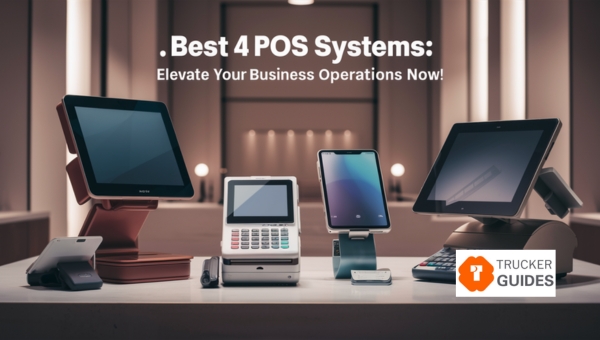

Are you ready to dive into the world of POS systems and discover how they can transform your business? Look no further! In this article, we’ll delve into what a POS system is, its key features, different types, and the benefits it offers.
Plus, we’ll take a glimpse into future trends. Whether you’re a retail store owner, a restaurateur, or simply curious, this comprehensive guide will ensure you’re up to speed. So, let’s embark on this journey to unlock the full potential of a POS system for your business!
A POS System, or Point of Sale System, is a combination of hardware and software used by businesses to process sales transactions. It functions as a central hub where sales, customer management, inventory tracking, and payment processing converge.
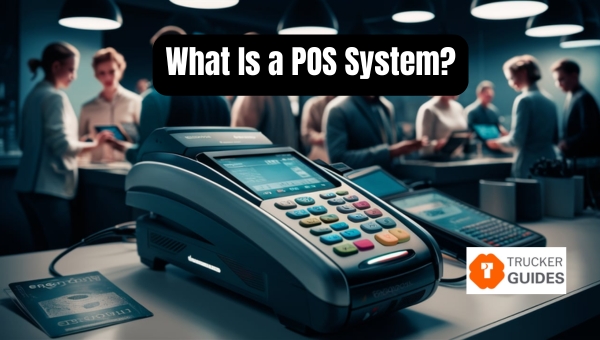
Imagine a cash register that also tracks stock levels, manages customer information, and generates reports. With a POS System, businesses can streamline their operations and improve efficiency. These systems can be found in various industries, from retail stores to restaurants, enhancing the overall customer experience and operational workflow.
In essence, a POS System is vital for modern business management.
Also Read: Analog Phone System vs VoIP
When exploring POS Systems, it’s crucial to understand the key features that make them essential for businesses.
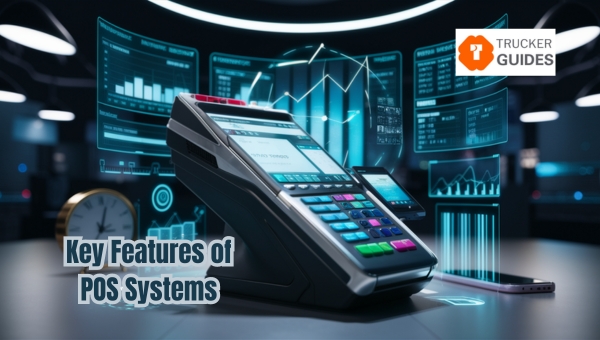
These systems offer a variety of functionalities that enhance operations and improve customer service. Let’s dive into the main features that make POS Systems stand out.
Payment processing is a core feature of any POS System. It allows businesses to accept various forms of payment, including credit and debit cards, mobile payments, and cash.
Having a reliable payment processing system ensures smooth and swift transactions, reducing wait times for customers. This feature not only speeds up the checkout process but also minimizes errors that can occur with manual entries, ensuring accurate record-keeping.
Inventory management is another critical aspect of POS Systems. This feature helps businesses keep track of their stock levels in real time.
By automatically updating inventory counts whenever a sale is made, it prevents stockouts and overstock situations. This ensures that you always have the right amount of product on hand, which can significantly improve customer satisfaction and reduce waste.
Customer management features in POS Systems allow businesses to collect and store customer information. This can include purchase history, preferences, and personal details.
With this data, businesses can offer personalized experiences, create targeted marketing campaigns, and build stronger relationships with their customers. It’s a powerful tool for increasing customer loyalty and boosting sales.
Reporting and analytics are vital for making informed business decisions. POS Systems with robust reporting capabilities can provide insights into:
These reports help businesses identify strengths and areas for improvement, guiding strategic planning and operational efficiency.
Also Read: Asana vs Monday.com
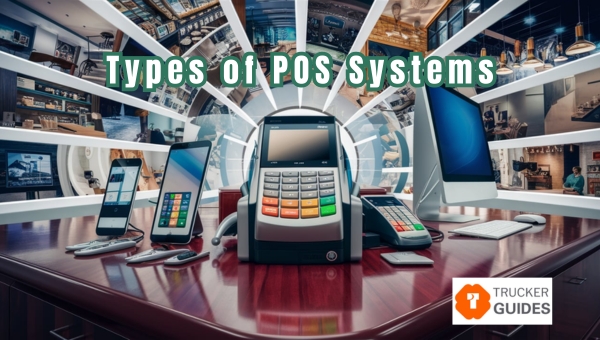
Retail POS systems are designed specifically for stores and shops. These systems help retailers manage transactions, track inventory, and analyze sales data.
They are essential for ensuring smooth operations and keeping customers happy. With features like barcode scanning, receipt printing, and real-time inventory updates, retail POS systems streamline the entire sales process.
Restaurant POS systems are tailored to meet the unique needs of the food service industry. Here are some key features:
Restaurant POS systems help improve service speed and accuracy, making dining experiences more enjoyable.
Mobile POS systems are portable and can be used on smartphones or tablets. They are ideal for small businesses, pop-up shops, and on-the-go services. Here’s what makes them stand out:
Mobile POS systems offer convenience and flexibility, making them a popular choice for modern businesses.
Also Read: The 30 Major Causes Of Failure
POS Systems offer numerous benefits that can transform how businesses operate. From improving efficiency to enhancing customer experience, these systems streamline operations and provide valuable insights. Let’s explore the key advantages of using a POS System.
A POS System significantly boosts efficiency and speed in a business setting. By automating transactions, it reduces the time employees spend on manual entry, allowing them to serve more customers quickly.
This system also helps in managing inventory in real time, ensuring that stock levels are always up-to-date.
The ease of processing payments, whether through credit cards, mobile payments, or cash, means shorter lines and happier customers. Essentially, a POS System enables businesses to operate smoothly, saving both time and effort.
By leveraging the benefits of a POS System, businesses can not only improve their operational efficiency but also provide a better experience for their customers.
| POS System | Best For | Payment Processing Fees | Monthly Fee |
|---|---|---|---|
| Square | Overall POS system | In-person: 2.6% + $0.10 | $0.00 and up |
| Shopify | E-commerce platform integration | In-person: 2.6% + $0.10 | $39.00 and up |
| Helcim | High sales volumes | In-person: 0.4% + $0.08 | $0.00 |
| Clover | Choosing your own payment processor | In-person: 2.3% + $0.10 | $0.00 and up |
| Toast | Restaurants doing dine-in and online | 2.49% + $0.15 (hardware upfront) | $0.00 Starter Kit; $69 plan |
| SpotOn Restaurant | Restaurant-specific add-on features | 1.99% + $0.25 | $0.00 and up |
| SumUp | Automated marketing | In-person: 2.6% + $0.10 | $0.00 for card readers only |
| Lightspeed Retail | Inventory management | In-person: 2.6% + $0.10 | $109.00 and up |
| TouchBistro | Offline functionality for restaurants | N/A (quote-based) | $69.00 and up |
| U.S. Bank Merchant Services | Bank POS provider | In-person: 2.6% + $0.10 | $0.00 and up |
Square is a popular point-of-sale (POS) system that offers a comprehensive solution for businesses of all sizes. It provides an intuitive and user-friendly interface, making it easy for merchants to manage their sales, inventory, and customer data.
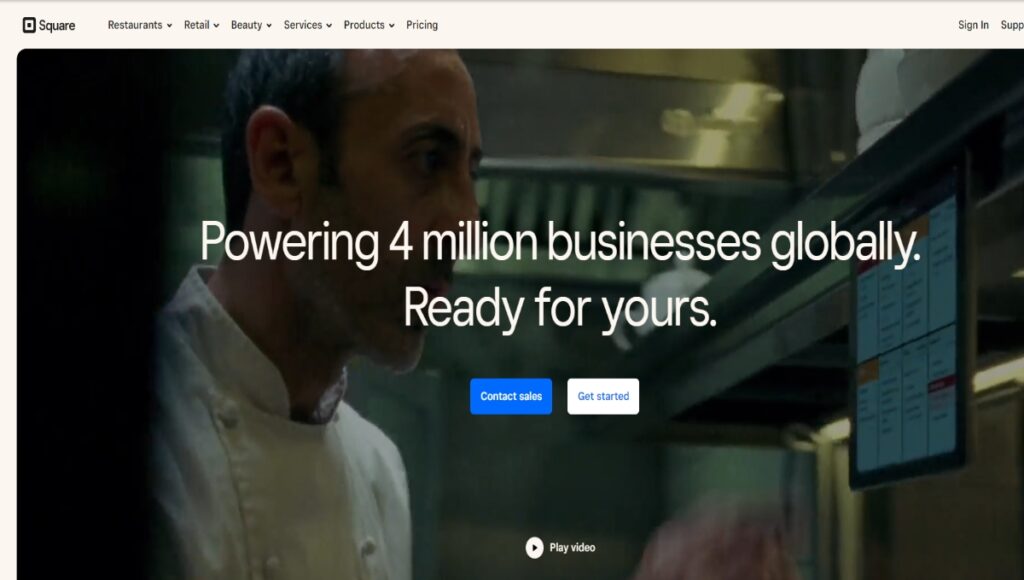
Square’s transparent pricing, lack of long-term contracts, and strong integrations make it a top choice for many businesses.
| Pros | Cons |
|---|---|
| Free plan option available | Can’t run on Windows devices |
| Offers helpful related services, like payroll, that integrate closely with its POS system | Complex industries might prefer a more specialized system |
| No long-term contracts or termination fees | – |
| All plans include a free online store | – |
Square offers a range of pricing plans to suit different business needs. Here’s a breakdown of their pricing structure:
Shopify is a comprehensive e-commerce platform that enables businesses to create and manage their online stores. It offers a user-friendly interface, a wide range of customizable themes, and a robust set of features to help businesses sell products and services online.

Shopify, businesses can easily set up their online presence, manage inventory, process payments, and track sales and customer data.
| Pros | Cons |
|---|---|
| Comprehensive e-commerce solution | Monthly subscription fees |
| Wide range of customizable themes | Transaction fees for non-Shopify payment gateways |
| Secure payment processing | Limited customization options for advanced users |
| Robust inventory management system | Steep learning curve for beginners |
| Detailed reporting and analytics | Can be expensive for high-volume businesses |
| Mobile Optimization | Dependency on Shopify for hosting and maintenance |
| Multichannel selling capabilities | |
| Discounted shipping rates |
Shopify offers several pricing plans to suit businesses of different sizes:
Helcim is a comprehensive payment processing and point-of-sale (POS) solution designed primarily for businesses with high sales volumes. It offers a range of services including payment processing, invoicing, and business management tools, making it a versatile choice for various business needs.
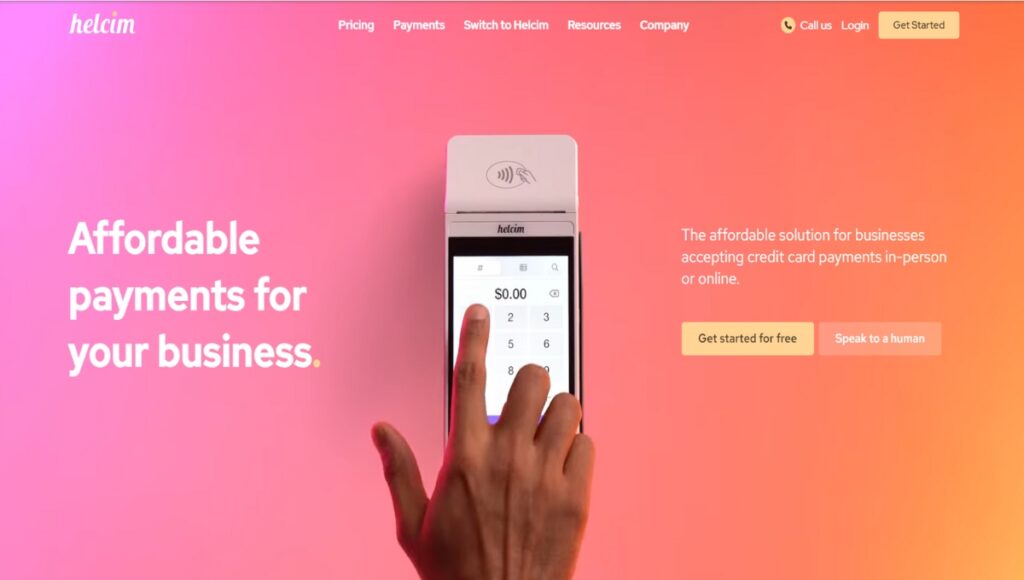
Helcim is particularly noted for its volume discounts, which can significantly reduce costs for businesses processing over $50,000 in monthly credit card transactions.
| Pros | Cons |
|---|---|
| No monthly software fees | Some hardware only available through third-party providers |
| No long-term contracts or termination fees | Lacks full POS register options |
| Volume discounts for businesses exceeding $50,000/month | Limited hardware options may require additional purchases |
| Interchange-plus processing rates can reduce costs | Not all features may be necessary for smaller businesses |
Clover is a popular point-of-sale (POS) system that offers a range of hardware options and software features for small businesses.
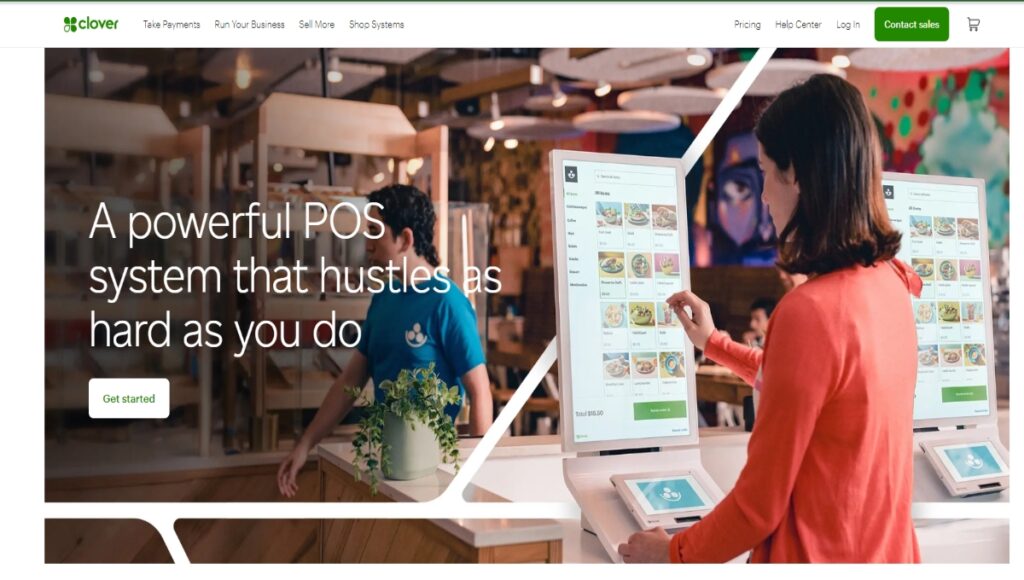
It is known for its flexibility in allowing merchants to choose their own payment processor, unlike many other POS systems that require you to use their in-house processing.
| Pros | Cons |
|---|---|
| Flexibility to choose payment processor | Requires purchasing hardware directly from the payment processor |
| Variety of hardware options | Online payment processing rates are more expensive than competitors |
| Includes basic POS features | Charges termination fees, though they may be waived in certain cases |
| Offers additional apps and integrations | Popular accounting integrations are only available through third-party apps |
| 24/7 phone and email support |
Toast is a comprehensive restaurant management platform that provides a range of services tailored specifically for the food and beverage industry. It is designed to streamline operations, enhance customer experiences, and ultimately drive profitability for restaurants.
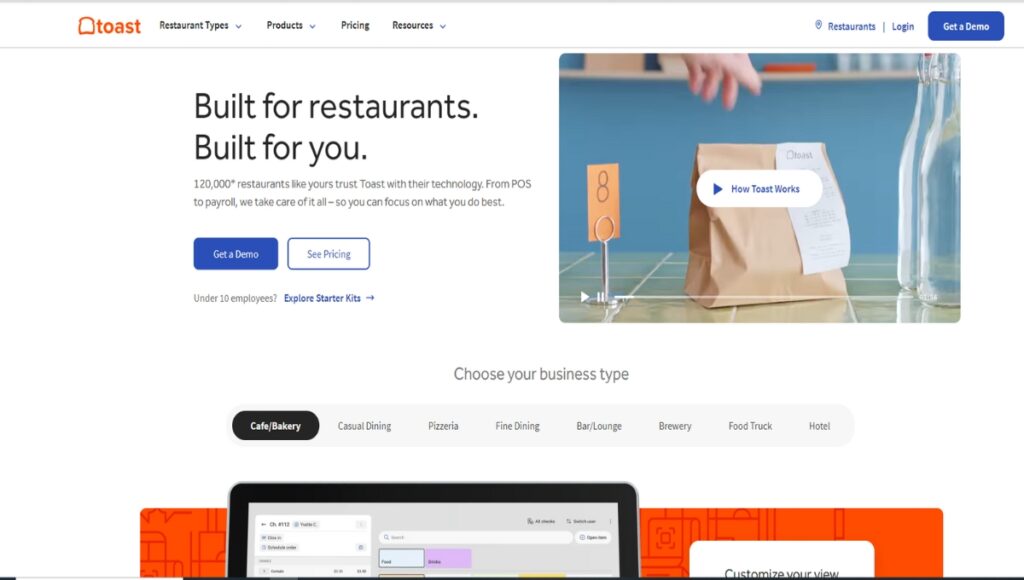
With a focus on ease of use and integration, Toast serves over 112,000 restaurants, offering solutions that encompass point-of-sale (POS) systems, payroll management, and more.
| Pros | Cons |
|---|---|
| A comprehensive suite of restaurant tools | May have a learning curve for new users |
| Reliable offline functionality | Additional charges for extra devices |
| Strong customer support | Pricing can vary significantly based on features and services |
| High level of integration with other tools | Limited to the restaurant industry |
SpotOn Restaurant is a comprehensive restaurant management system that integrates point-of-sale (POS) capabilities with features designed to enhance operational efficiency and improve customer service. Its cloud-based platform ensures that restaurant owners and staff can access critical data anytime, anywhere, facilitating informed decision-making and streamlined operations.
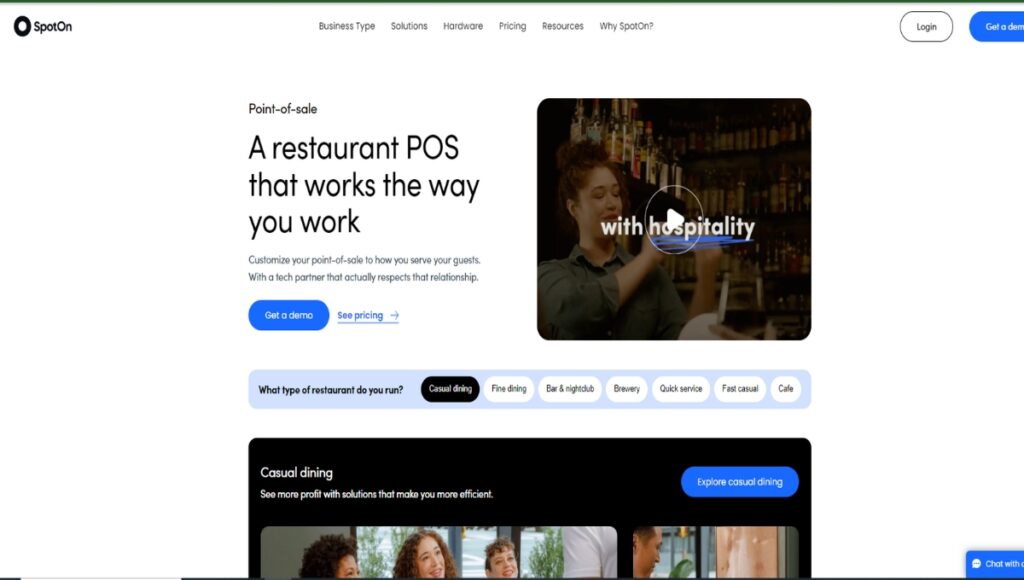
SpotOn is designed to adapt to various restaurant environments, providing a customizable and intuitive interface that enhances the dining experience.
| Pros | Cons |
|---|---|
| Highly customizable to fit various needs | May require training for new users |
| Cloud-based access allows for flexibility | Potential reliance on Internet connectivity |
| Robust reporting features for insights | Pricing may be higher than some competitors |
| Offline functionality enhances reliability | The initial setup can be complex |
| User-friendly interface improves staff efficiency | Limited features for non-restaurant businesses |
SpotOn positions itself as a partner in hospitality, focusing on enhancing the restaurant experience through technology and innovation.
SumUp is a financial technology company that provides payment solutions and point-of-sale (POS) systems designed to facilitate seamless transactions for businesses of all sizes. With a focus on simplicity and efficiency.
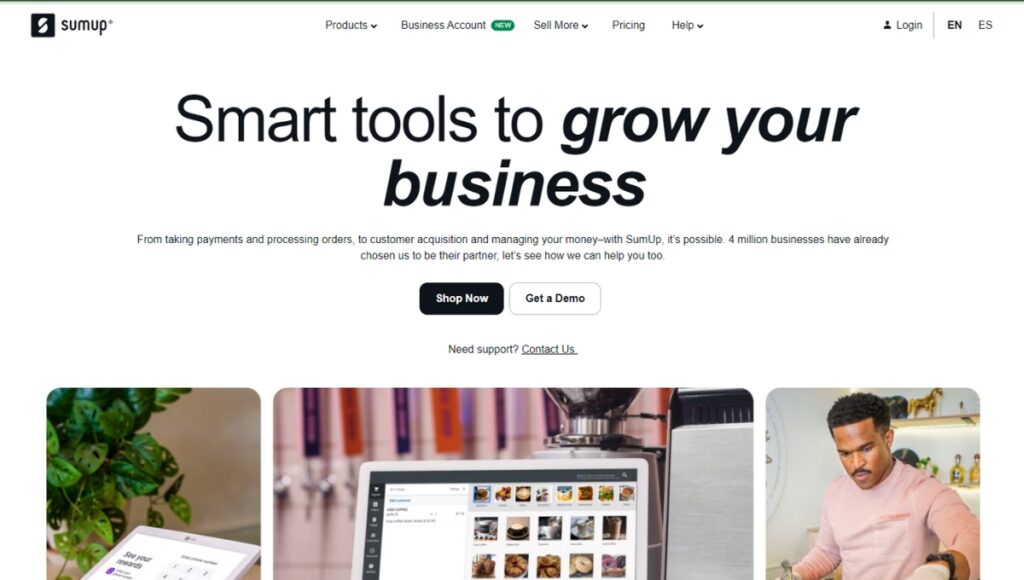
SumUp allows merchants to accept various payment types, manage sales, and track customer interactions through its user-friendly software and reliable hardware.
| Pros | Cons |
|---|---|
| User-friendly interface and setup | Limited advanced features compared to larger POS systems |
| Transparent pricing with no hidden fees | May not support all payment methods globally |
| Industry-specific solutions | Customer support can be slow during peak times |
| Fast transaction processing | Hardware may require additional investment for some features |
| Mobile app accessibility | Limited customization options for reports and analytics |
Lightspeed Retail is a comprehensive retail management platform designed to streamline operations and enhance growth for businesses. With a focus on providing a unified commerce experience, Lightspeed enables retailers to manage sales, inventory, customers, suppliers, and reporting in real-time.
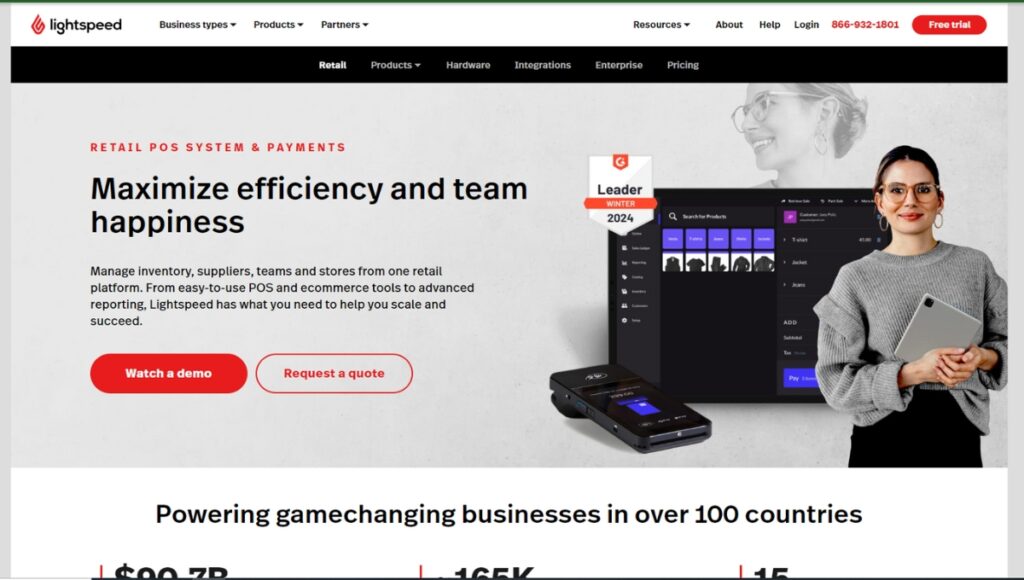
The platform is particularly noted for its intuitive features and extensive integration capabilities with leading retail applications.
| Pros | Cons |
|---|---|
| Intuitive and user-friendly interface | May require training for new users |
| Comprehensive support options | Pricing may be higher than some competitors |
| Strong integration with third-party applications | Limited offline capabilities |
| Real-time analytics and reporting | Some features may be unnecessary for smaller businesses |
Lightspeed serves around 165,000 locations globally, processing approximately $90.7 billion in gross transaction volume (GTV) in fiscal 2024, showcasing its robust performance and trust within the retail industry.
TouchBistro is an all-in-one restaurant management platform designed to streamline operations, enhance guest experiences, and drive business growth.
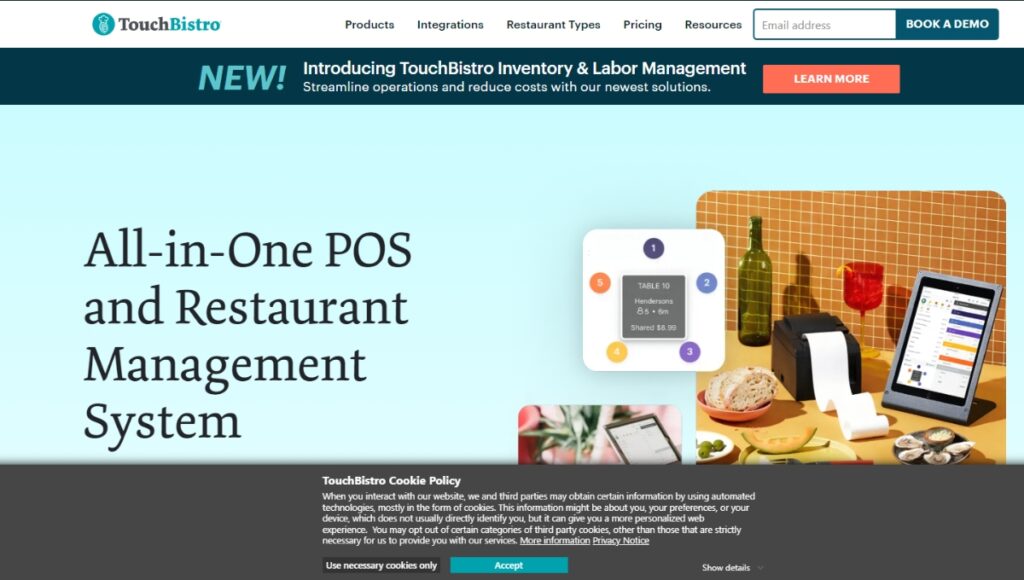
This cloud-based POS system offers a suite of solutions for front-of-house, back-of-house, and guest engagement, all accessible from a single intuitive interface.
| Pros | Cons |
|---|---|
| Comprehensive all-in-one solution | The potential learning curve for staff |
| Intuitive and easy-to-use interface | Ongoing subscription fees |
| Improved speed of service and reduced errors | Potential reliance on a stable internet connection |
| Enhanced guest engagement and loyalty | Limited customization options for advanced users |
TouchBistro offers flexible pricing plans to suit the needs of restaurants of all sizes. Key points about their pricing:
U.S. Bank Merchant Services is one of the largest commercial banks in the United States, providing a wide range of financial services to individuals, businesses, and institutions. Founded in 1863, U.S. Bank operates branches across the country and offers various products, including personal and business banking, investment services, and wealth management.
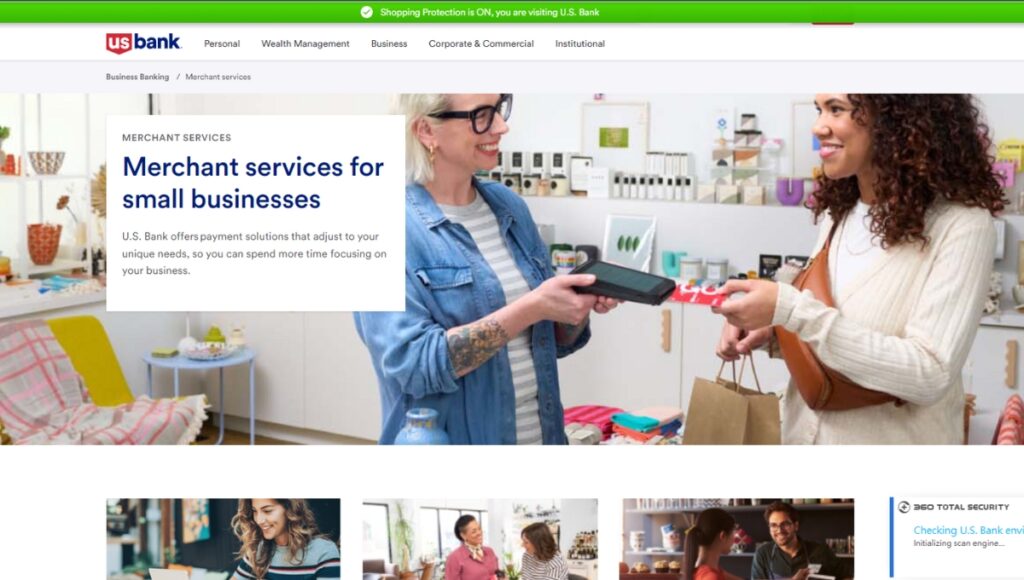
The bank is known for its commitment to customer service and community involvement.
| Pros | Cons |
|---|---|
| Extensive branch and ATM network | Fees can be high for certain accounts |
| Wide range of financial products | Customer service experiences vary |
| Strong digital banking capabilities | Limited international presence |
| Good reputation and stability | Some accounts require high minimum balances |
U.S. Bank offers a comprehensive suite of financial services tailored to meet the needs of both personal and business customers, emphasizing accessibility and customer support.
The future of POS systems is evolving rapidly, driven by technological advancements. One significant trend is the integration of cloud-based POS systems, offering real-time data access and flexibility. Enhanced security features are also becoming a priority, ensuring safe transactions.
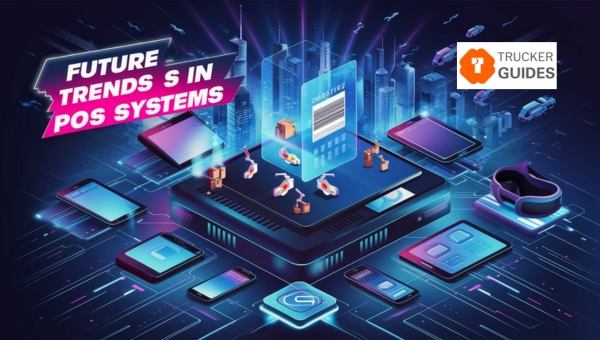
Another trend is the use of artificial intelligence for personalized customer experiences and predictive analytics. Mobile POS systems are on the rise, enabling businesses to accept payments anywhere.
Additionally, the incorporation of contactless payments and digital wallets is gaining popularity. Lastly, the shift towards omnichannel retail is providing seamless shopping experiences across various platforms, making POS systems more versatile.
Implementing a POS System can be a game-changer for businesses of all sizes. These systems streamline operations, improve customer satisfaction, and offer insightful data to help make informed decisions.
From payment processing to inventory management, a POS System covers all the essential aspects of running a smooth and efficient business. By adopting the right POS System, you can significantly enhance your business’s efficiency and profitability.